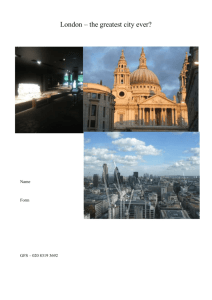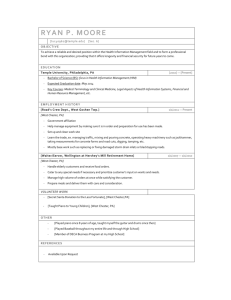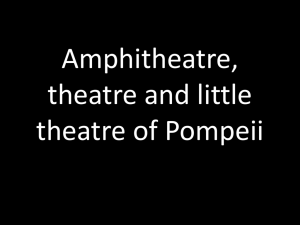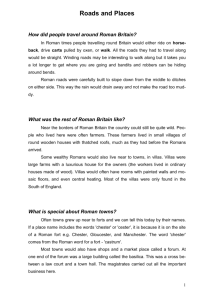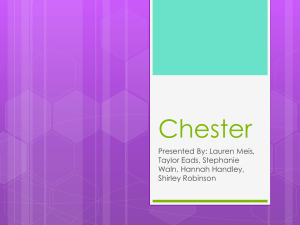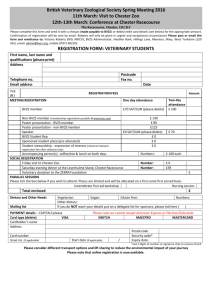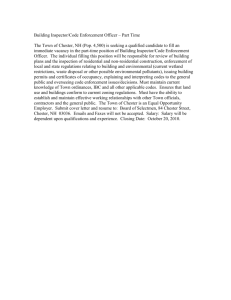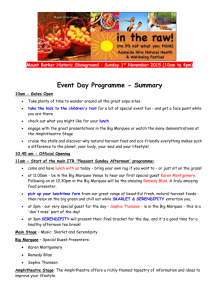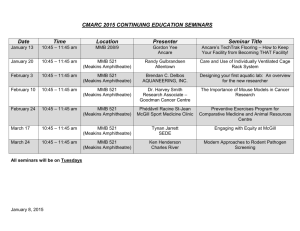lesson template - History Channel
advertisement
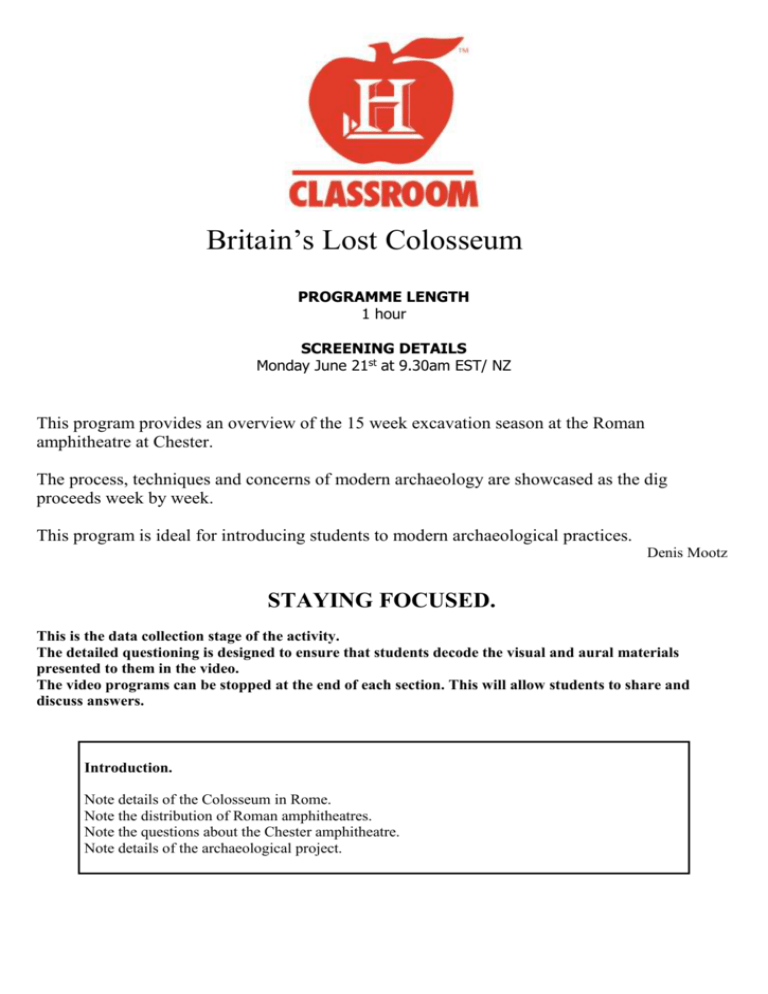
Britain’s Lost Colosseum PROGRAMME LENGTH 1 hour SCREENING DETAILS Monday June 21st at 9.30am EST/ NZ This program provides an overview of the 15 week excavation season at the Roman amphitheatre at Chester. The process, techniques and concerns of modern archaeology are showcased as the dig proceeds week by week. This program is ideal for introducing students to modern archaeological practices. Denis Mootz STAYING FOCUSED. This is the data collection stage of the activity. The detailed questioning is designed to ensure that students decode the visual and aural materials presented to them in the video. The video programs can be stopped at the end of each section. This will allow students to share and discuss answers. Introduction. Note details of the Colosseum in Rome. Note the distribution of Roman amphitheatres. Note the questions about the Chester amphitheatre. Note details of the archaeological project. Act 1. Note details of the excavation. Note details of the archaeological team. Why is manual labour necessary? Note the allegory of a ‘layer cake’. Note Chester’s Roman heritage. Note details known about the Chester amphitheatre. Note details of the Roman conquest of Britain. Why was Britain desirable for the Romans? Note Dai Morgan Evans’ comments on Roman Britain. How were the frontiers of Britain guarded? Note the place of Chester in Roman Britain. Why was Vespasian concerned with victory in Britain? Note Keith Matthews’s comments on a planned invasion of Ireland. Note the role Chester would play in an expanded Britannia. What evidence exists at Chester to support this theory? Why is Vespasian a candidate for building this amphitheatre? Note details of the history of excavations at Chester’s amphitheatre. Note details of the Thompson ‘theory’. Why is a new project necessary? Act 2. Note details of the planned excavation. Why are two trenches dug? Note Trench A. Note Trench B. What exciting discovery occurs in Trench A? Implications? Note the discussion of earlier ‘techniques’. How have ‘techniques’ changed? Why? Note where ‘finds’ are processed. Note how finds are processed? Why is it possible to recover much that was missed in the 1960s? Note some of these finds. Note the relevant dating that can be established from these ‘finds’. What impeded work in Trench A? Result? Note the significant finds from the first month of excavations. Implications? Note the progress of work in Trench B. Why did problems continue in Trench A? Act 3. Why were there gladiators at Chester in Week 6 of the excavation? Note details of the gladiator contests staged in the amphitheatre. What was the symbolic purpose of gladiator contests? Note the amphitheatres built in Britannia. Note details of their construction. Why are Caerleon and Chester exceptions? Why is archaeology so important in this context? Note the evidence from London’s amphitheatre. How do we know that gladiators fought at Chester? Note the find on National Archaeology Day. Implication? Note the evidence that is accumulating. Implications? Why was work so hard in Week 7? Why would rain be welcome? Note Thompson’s theory about ‘two’ amphitheatres. Evidence? Note details of the timber amphitheatre. Why does Keith Matthews disagree with this theory? Note his alternative explanation. Note the discussion between Morgan Evans and Matthews. Result? What is the problem with the rain in Week 8? Result? Note the discussion by Wilmot and Garner about the ‘two’ amphitheatres. Why is little stone found? Result? Note the problem that emerged with the ‘medical probe’. Implications? Act 4. Note the entertainment at the amphitheatre at Arles. What did it cost to attend the amphitheatre? Note how people were allocated seats. Note the comments of Wilmot and Garner about the events at Arles. Note what emerged in Week 8. What exciting finds accompanied this work? Implications? What are the implications of the find ‘spot’? Why is a specialist brought in? Result? Implications? What is the unexpected result of this excavation? Note the explanation of the new theory. How did Morgan Evans and Matthews react to the new theory? Note details of the small stone amphitheatre. Note details of the large stone amphitheatre. What question remains to be answered in Week 15? Where is the ‘dating’ evidence likely to be found? Result? What is the result of analysis of the coin found? Implications? Note the results of the 15 week excavation season. Note Garner’s description of the ‘attraction’ of archaeology. EXTENSIONS. Useful, interesting, challenging, books, sources and websites will provide materials to supplement and complement the History presented in the video program. The data collected here should be used in the notemaking below. Some useful Internet sites: Project website: http://www.chester.gov.uk/amphitheatre/archive.htm Frederick Hugh Thompson: http://www.britarch.ac.uk/ba/ba11/BA11OBIT.HTML http://www.biab.ac.uk/online/results1.asp?ItemID=16299 Roman Britain: http://en.wikipedia.org/wiki/Roman_Britain http://www.bbc.co.uk/history/ancient/romans/questions_01.shtml http://www.historyworld.net/wrldhis/PlainTextHistories.asp?historyid=ac71 http://www.roman-britain.org/history/history_menu.htm http://www.britainexpress.com/History/Life_in_Roman_Britain.htm Chester: http://en.wikipedia.org/wiki/Deva_Victrix http://www.roman-britain.org/places/deva.htm http://en.wikipedia.org/wiki/Chester_Roman_Amphitheatre http://www.archaeology.ws/2005-5-23.htm (scroll through stories) http://news.bbc.co.uk/2/hi/uk_news/england/merseyside/6370899.stm http://www.cheshirewestandchester.gov.uk/visiting/heritage/archaeology/chester_amphitheatre.aspx http://univchester-parkdig.blogspot.com/ http://www.chestertourist.com/amphitheatre.htm Caerleon: http://www.geograph.org.uk/photo/1199 http://en.wikipedia.org/wiki/Isca_Augusta Amphitheatre: http://en.wikipedia.org/wiki/Amphitheatre#Roman_amphitheatres http://www.cityoflondon.gov.uk/Corporation/LGNL_Services/Leisure_and_culture/Museums_and_galle ries/Guildhall_Art_Gallery/ampitheatre.htm Vespasian: http://www.roman-empire.net/emperors/vespasian.html http://en.wikipedia.org/wiki/Vespasian http://www.livius.org/se-sg/7wonders/seven_wonders.html#H._The_Colosseum Gladiators: http://en.wikipedia.org/wiki/Gladiator http://ablemedia.com/ctcweb/consortium/gladiators.html Venationes: http://en.wikipedia.org/wiki/Venatio http://www.vroma.org/~bmcmanus/hunts.html A more recent discovery: http://www.google.com/hostednews/afp/article/ALeqM5hs2ei6f83udemXp-m-XjQ_y0PXiA NOTEMAKING. This is the collation stage of the activity. Students need to organise the field of information and begin to explore its context. Directions and /or Inquiry questions are provided for notemaking / summary exercises that will follow the viewing of the video. The materials / data for the summaries have been collected above. The activity could be done in teams, groups, or by individuals, or as a class with teacher direction. 1. Draw up a timeline / chronological chart of the events described and discussed in this program. 2. Note details of the Roman conquest and occupation of Britain. 3. Note details of the Emperor Vespasian. 4. Note details of the city of Deva Victrix (Chesters). 5. Note details of the amphitheatre at Chesters. 6. Note details of the archaeological project at Chesters. 7. Note details of the Thompson ‘theory’. 8. Note details of the arguments put forward by Morgan Evans and Matthews. 9. Note details of finds from the archaeological excavations conducted in the 15 week season. 10. Note details of the new theory. ISSUES & INQUIRY. Key issues and inquiry questions that have been raised by the video are addressed at this stage for discussion and research. 1. How have archaeological techniques changed since the 1960s? 2. Why do Morgan Evans and Matthews not settle their disagreement about the amphitheatre? Result? PROBLEMS of EVIDENCE. Questions of reliability and validity of the perspectives, evidence and sources presented in the video program need to be considered, tested and researched. 1. Why was it expected that the ‘dating find’ would come from a specific ‘spot’? 2. Why was the eventual dating find a disappointment? COMMUNICATING. The key issues and inquiry questions are potential topics for debate, essay writing, reports, historical recount and explanation. 1. Write a REPORT on the Chesters Amphitheatre Archaeological Project. 2. DEBATE the proposition that Ego may be more decisive than archaeological evidence in settling disagreements between archaeologists. 3. Explain the evidence that supports the new theory about the ‘two’ amphitheatres.
